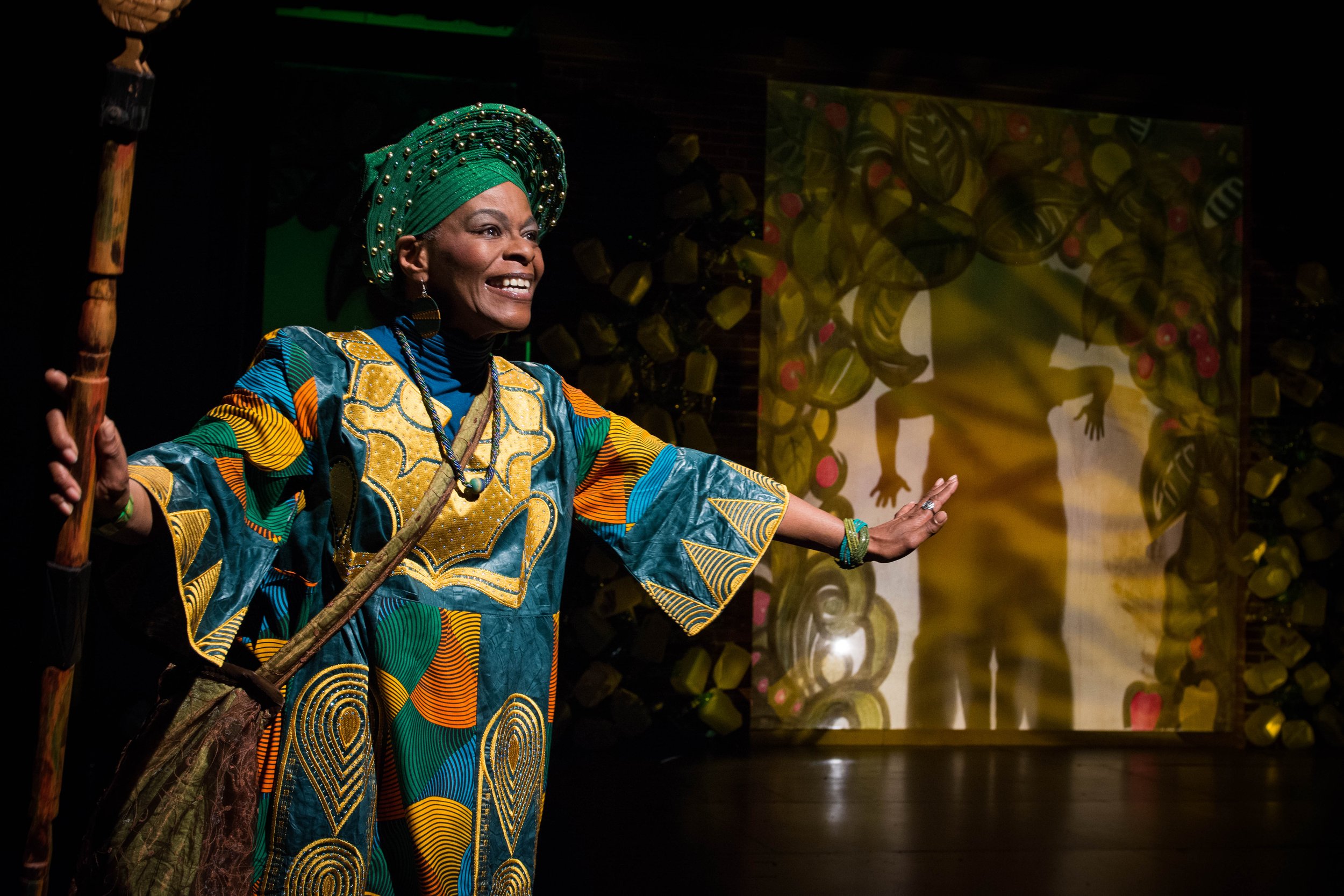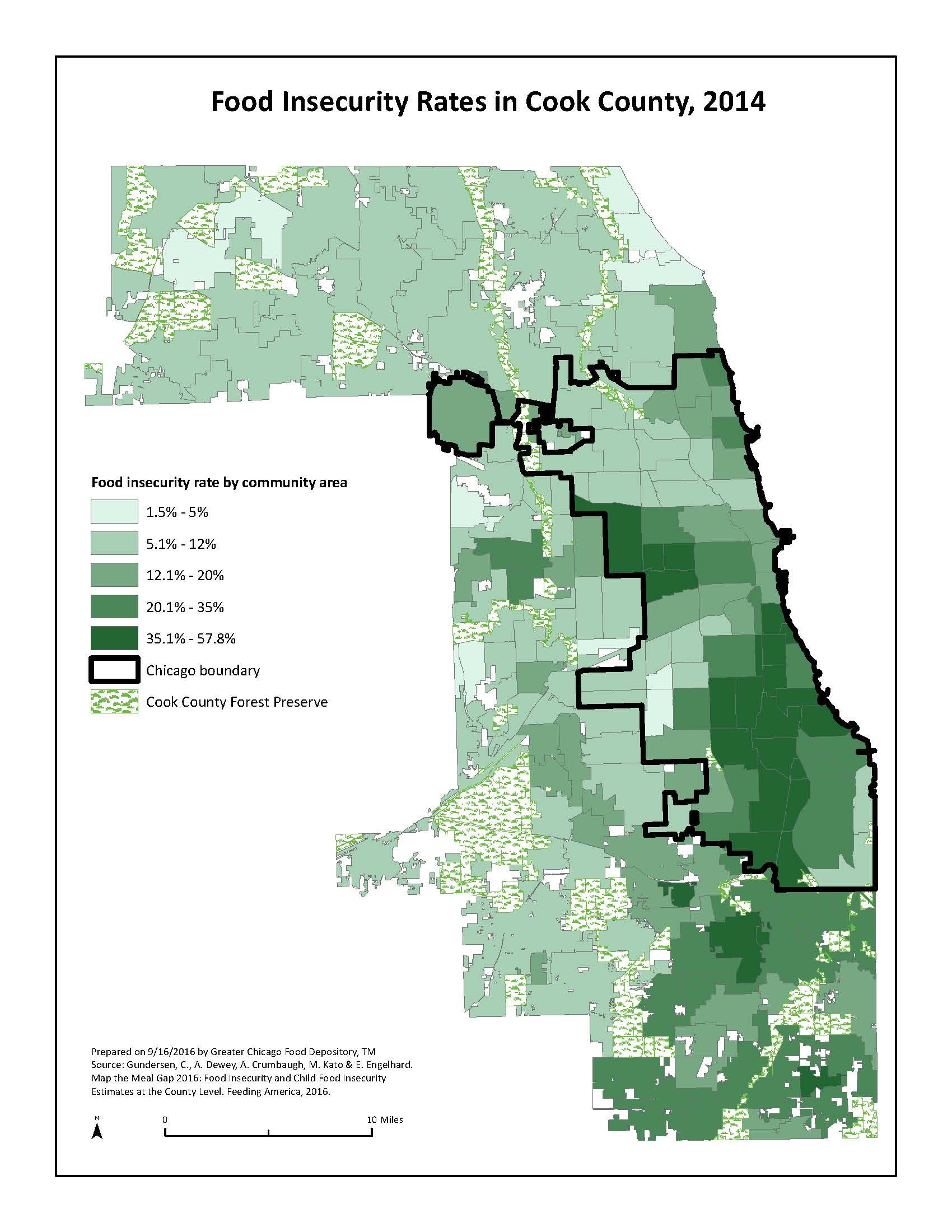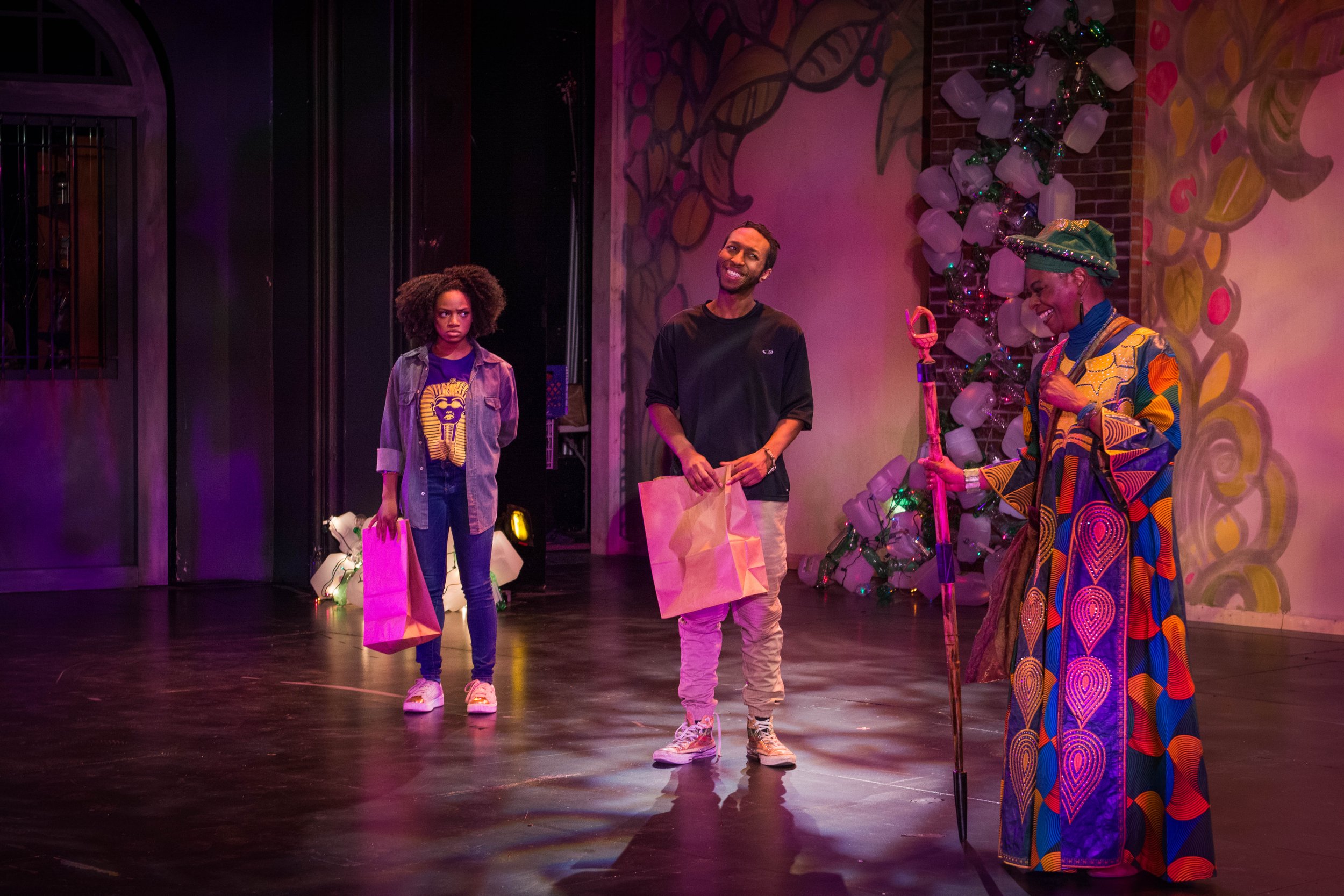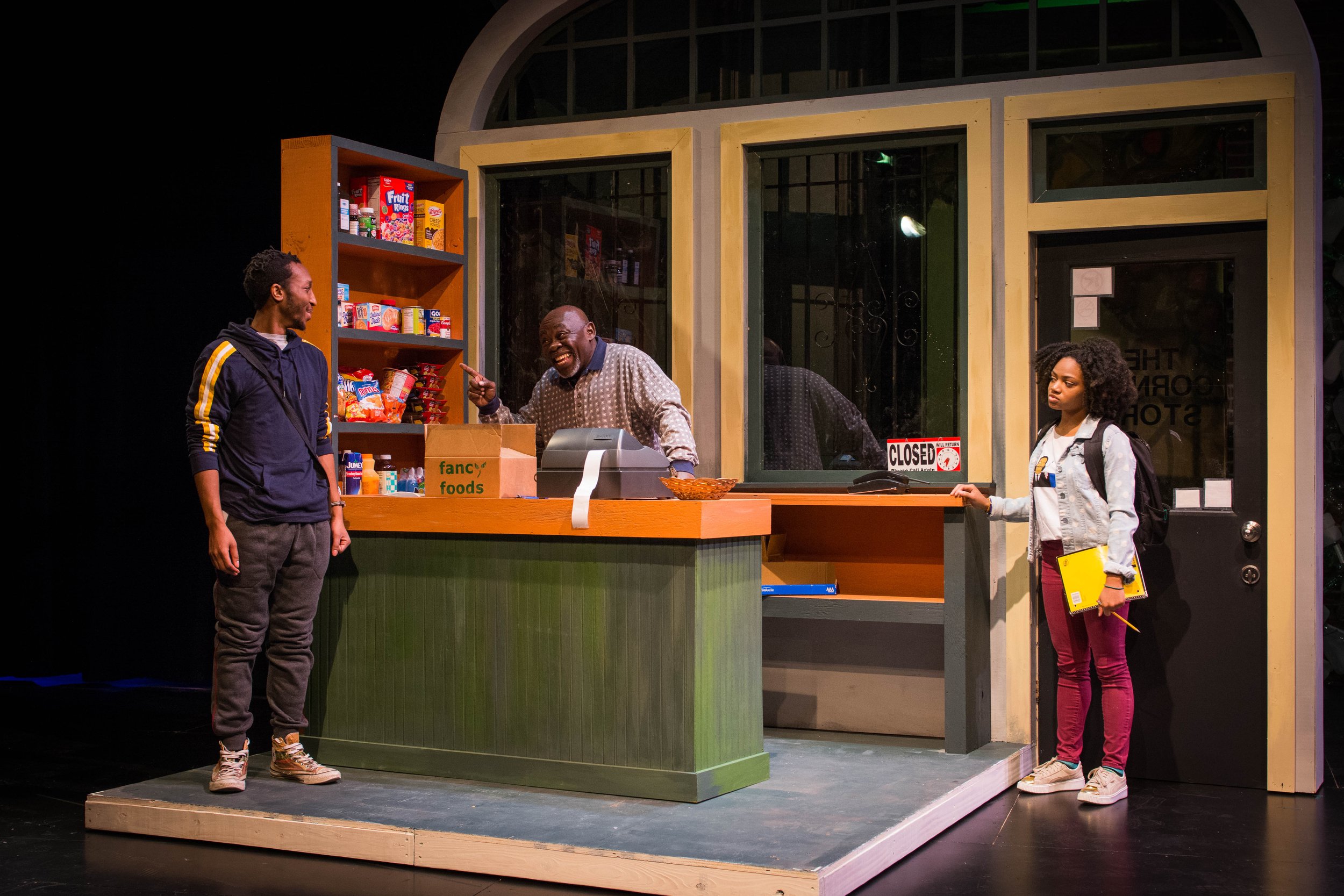Interview with Adventure Stage Chicago's Andrew Marikis on 'Fast Food Chain'
Feature
(Originally published on Chicago Stage Standard)
Chicago has its fair share of problems to say the least, but did you know food insecurity is one of the major ones that plagues the city of big shoulders to this day? The state of being without reliable access to a sufficient quantity of affordable, nutritious food seems impossible to imagine in 2019. According to the Feeding America Map for the Meal Gap Study, one in seven people in Cook County will experience food insecurity this year.
As a community, we can challenge this issue and tackle it head on through understanding and spreading awareness. Adventure Stage Chicago (ASC) presents the world premiere of ASC Artistic Associate Andrew Marikis’ Fast Food Chain from April 26 to May 18, 2019 at the Vittum Theater, 1012 N. Noble Street.
Fast Food Chain explores the many challenges of hunger, both literal and metaphorical by reimagining Igbo folk heroes Hare and Tortoise against the backdrop of Chicago in 2019. The story follows a brother and sister as they wrestle with the pressures of food insecurity in Chicago. Rudy is a teenage boy who dreams of becoming a famous chef. The problem is, his schemes usually involve getting him and his younger sister, Akari, into big trouble. Their family struggles with the pressure of food insecurity in Chicago until one day Rudy and Akari discover a garden in the unlikeliest of places.
This new play is written with help from Chicago students, diving into the magical realism of African folktale while showcasing the power of community and storytelling in combating social issues. Playwright Andrew Marikis worked with school, youth and community groups at Northwestern Settlement over 18 months, using their input and participation to integrate community stories into the world of the play. The resulting story about heroic youth amplifies the mission of the Settlement, educating and inspiring its community to help disrupt generational poverty in Chicago. The Northwestern Settlement’s Adventure Stage Chicago is one of the only theaters in Chicago to develop and present works specifically for the pre-teen and teenage audience.
Food insecurity is not bias; it effects children, older adults, people with disabilities, veterans, and others. Many struggle with trade off decisions between paying for food and other basic necessities – some do not qualify for federal nutrition assistance programs (www.chicagosfoodbank.org). This information really makes you think, and that's exactly what Fast Food Chains intends for the audience - to make us think and reflect. In a recent interview, playwright Andrew Marikis discusses the inspiration, intention and impact behind their latest work.
What sparked your interest in blending folk stories with socio-economical narratives?
When I started working on this play, I knew I wanted to continue Adventure Stage Chicago’s tradition of reinterpreting classical texts for a young audience, and I knew I wanted to talk about food, partly because I love food, and partly because limited access to food and to food knowledge is a social justice problem that just really bothers me. The idea of kids not having enough good meals makes me upset. So, I did some research and some facts popped out to me: only about half of all the food grown in the United States is eaten (the rest goes to waste), and food deserts – places where people just can’t buy good food - are very common in Chicago, hitting communities of color the hardest. So, I started looking around for good stories that would help me have this discussion in an exciting and engaging way; I looked at Mesoamerican, South American, and other African story traditions, but when I started reading Igbo and Yoruba stories, it all clicked. These stories are so different from European fairy tales and stories I’m used to hearing. They are more unconfined and unpredictable. I know a lot of young folks in Chicago are in the position of Hare and Akari in Fast Food Chain – they don’t know where their next meal might be coming from, and they’re facing a lot of other very adult situations that they feel they need to deal with on their own. What I like about Igbo and Yoruba folktales is they don’t sugarcoat things. They don’t talk down to their audience. They deal with adult situations. But, because it’s Hare and Tortoise and Rat and Lion, they can tell a dark story in a way that doesn’t scare or overwhelm us. When Lion eats Rat, we may sympathize with Rat, even fear for her, but we can still laugh, because it’s just a lion eating a rat. That metaphorical distance makes these stories so powerful and beautiful. And at their core, all of these stories are about food- who has it, who wants it, what people will do to get it, and how a community comes together or falls apart in the face of starvation. And that’s when I found my protagonist – a young person who needs things but is unwilling to compromise to get them, who thinks instead of fights, and who is willing to do anything to get what he wants – the trickster, Hare. From there I started asking, “Who would Hare be if Hare was just a person alive today?” And I was off to the races.
I read that your work is written with help from Chicago students, can you expand on what that process was like?
As part of Adventure Stage Chicago’s Discovery Sessions, I went into classrooms at Sabin Dual Language Magnet School and Johnnie Coleman Academy three or four times and each time I told them stories about Hare and Tortoise and we did different activities to talk about the themes, the characters, food, and their lives. We asked for the wildest recipes they would make up if they could. We asked them to talk about their neighborhoods and the places they thought of as safe, fun, unsafe, or exciting. We asked them to tell us stories about their lives inspired by the Igbo and Yoruba stories. We even got their reactions to scenes of the play, after I had written them. We also had the privilege of a conversation with the people at Growing Home, an urban farm that helps folks with barriers to employment grow their resume. In each of these sessions, my main jobs were to tell some Igbo and Yoruba stories and to listen. I learned so much about what excited young people about these stories, what real-life experiences they inspired, and who the characters of Hare, Tortoise, Rat, and Lion would be if they lived in our city. Then I took these impressions, inspirations, and questions and worked them back into the play.
As a playwright and artist, how did you find balancing the collaborative aspect of working with students and your own imaginative voice within this work?
I actually prefer working in collaboration – with as many people as possible! Most of my career has been spent making theatre as part of an ensemble. I’m a volunteer mentor for the Trailblazers - a group of young and adult artists working together to devise and write original theatre based on the young artists’ lives. When I was the Lead Teaching Artist of the Trailblazers, I helped build five original full-length plays, but my voice was only one of almost two dozen, and I was more of a facilitator and collator thank a playwright. Fast Food Chain is the first play that demanded that I sit alone in a room and write. What I was writing was profoundly influenced by the Discovery Sessions with young people and community members, and I worked hard to make sure their voices can be heard throughout the piece, but in the end, I was the one responsible for making the play. And that was intimidating! I am incredibly proud of Fast Food Chain, but to tell the truth, I’ll be happy to return to an even more collaborative style of theatre-making, for a while at least.
Do you think this collaborative immersive style of gathering real life context and inspiration would be an approach that you use again for any future works?
Absolutely! I will have a hard time if I decide to try to write a play without community partnerships and collaborative discussions in the future. Using just your one voice to create the many voices in a play is almost impossible! To write a good play, I think you need a few voices echoing around in there.
What do you want the audience to take away from having seen your play?
If they walk out of the theatre with one takeaway, I hope it’s a bug in their ear telling them that they have power – that by telling their stories, and the stories of their communities in their own voice, they can make change.
As a huge advocate for multi-cultural storytelling, there is a rich source material in West African folktales with application to current events. There is much to be learned from historical folk lore and Marikis has honed in execution to share with others in a brilliantly engaging way. This is his first full-length play at Adventure Stage Chicago. As a devisor, Marikis was lead teaching artist with the Adventure Stage Chicago Trailblazer—a mixed-age devising ensemble—for two years and is a resident artist with Filament Theatre, where he most recently helped develop and remount FORTS, an interactive play installation. This work is a step in the right direction for informative and engaging theater that demands reflection on current social issues that will hopefully spark more efforts to diminishing food insecurity starting in our local communities.
Fast Food Chain continues ASC’s 15th season and is directed by Black Ensemble Theater’s Daryl Brooks, who helmed ASC’s Akeelah and the Bee last season. The talented cast includes Davon Roberts (Rudy), La Shone T. Kelly (Akari), Sonya Cha’Rae (Ursula), Yahdina U-Deen (Mbeku), Kelvin Davis (Eddie), Rian Jairell (Mr. Lyons) and Lisa Revis (Shadow 1).
Fast Food Chain plays now on Saturdays through May 18, 2019 at the Vittum Theater, 1012 N. Noble Street. To purchase tickets for Fast Food Chain or for more information, visit adventurestage.org or call 773-342-4141.
For the Feeding America national food insecurity map, https://map.feedingamerica.org/
For the Cook County food insecurity map, https://www.chicagosfoodbank.org/map-statistics/
For more information on Northwestern Settlement, www.northwesternsettlement.org



